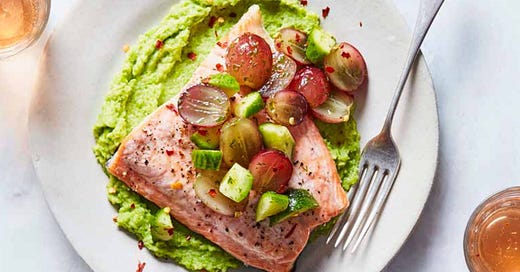Salmon with Broccoli-Pea Puree and Cucumber-Grape-Dill Salsa
3 things omega-3s do for your gut + win a copy of Help Yourself

Hello, everyone. I am hearing from you that our gut-brain-axis mini-series has been helpful so far. That makes me incredibly happy! My mission with this newsletter is to give you the information you want and need to help you live your best brain-healthy life. Now that you are all experts on prebiotics, probiotics, and the estrobolome, let’s delve into an important nutrient for both brain and gut health: omega-3 fats.
Catch up on our gut microbiome mini-series:
When you choose foods rich in omega-3 fats, such as wild-caught salmon and anchovies, you probably aren’t thinking about your gut health. After all, these foods have a well-deserved reputation as brain foods. Today, we’re delving into what omega-3 fats can do for your gut, too.
Plus, I’ll be giving away a copy of my favorite gut health cookbook: Help Yourself: A Guide To Gut Health For People Who Love Delicious Food by
, author of the Substack . You may recognize Lindsay from my Recommendations list and as the editor of this newsletter. I’m also sharing Lindsay’s gorgeous (but easy!) recipe Salmon with Broccoli-Pea Puree and Cucumber-Grape-Dill Salsa from the book. Thanks, Lindsay!Before we get to the recipe, let’s take a look at what omega-3 fats are, exactly, and what they can do for your brain and gut.
Omega-3s are essential fatty acids
Whenever a nutrient is dubbed “essential,” it means the body is incapable of synthesizing it. This means you have to get it through food or supplements. There are three types of omega-3 fats found in foods:
Alpha linolenic acid (ALA) is found in plant foods like nuts, seeds, whole grains, and soy. In the American diet, most of the ALA comes from cooking oils such as canola, soybean, and corn oil. This omega-3 has anti-inflammatory actions throughout the body.
Eicosapentaenoic acid (EPA) is found in fish (especially cold water fish like salmon and herring) and certain species of algae. EPA is an important driver of cardiovascular health.
Docosahexaenoic acid (DHA) is also found in cold water fish and algae. DHA exerts its anti-inflammatory action primarily in the brain.
In the brain, DHA and EPA are key anti-inflammatory nutrients. They cross the blood brain barrier to protect the brain from things like environmental toxins (such as wildfire smoke) and advanced glycation end products (AGEs) in foods. They repair age-related damage to brain cells, and actually become incorporated into the cell’s protective sheaths. These fats are so key to brain health that a low intake is associated with poor cognitive function with age. A deficiency state of DHA and EPA is associated with an increased risk of Alzheimer’s. Think of DHA and EPA as calming and reparative. They are essential for preventing Alzheimer’s.
3 things omega-3 do for the gut
There’s less known about the action of omega-3s in the gut than the brain, but there are three beneficial actions that stand out.




